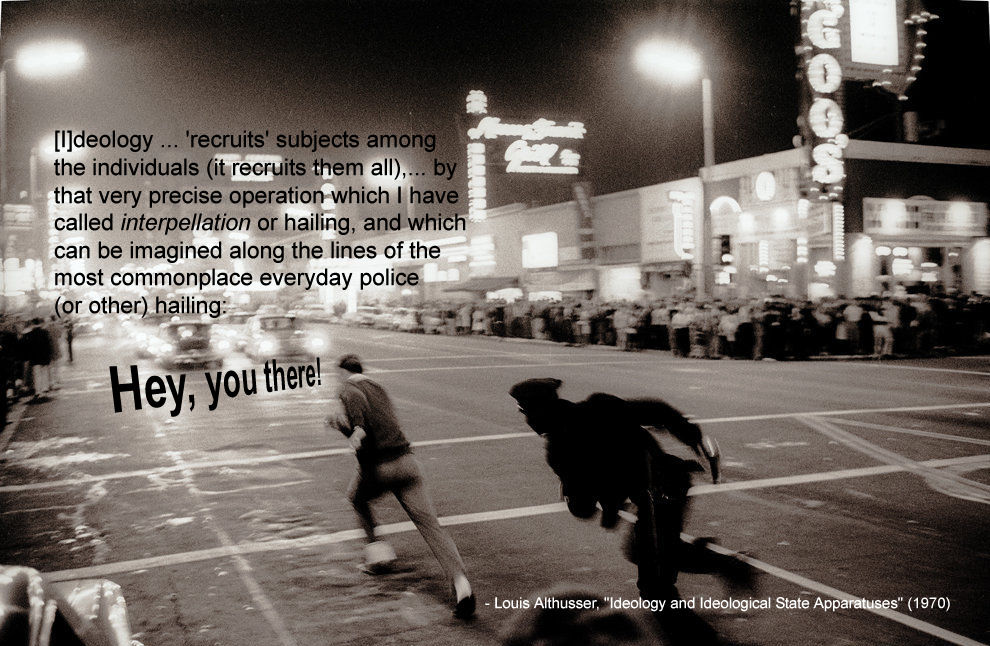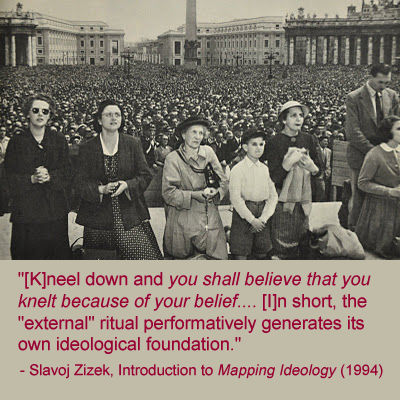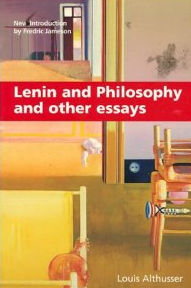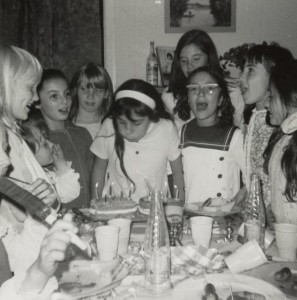
Do you know about the Paris-based singer ALA.NI…?

A Peer Reviewed Blog
In “Ideology and Ideological State Apparatuses” — an essay excerpted from a longer work only recently available in English, On the Reproduction of Capitalism — Althusser offers a definition of ideology: “Ideology represents the imaginary relationship of individuals to their real conditions of existence.” On this definition — and contrary to classic Marxist approaches — ideology is not an imaginary (i.e., false) depiction of our real conditions of existence. Rather, ideology is the set of processes by which we imagine ourselves into our real conditions of existence.
Consider, for instance, the depiction of farms in children’s toys in the images below.
 The ease with which identity is presumed to be an inner trait projected outward is pretty easy to document, which makes critiquing it something less than a challenge. For example, I thought about writing a post on the new film “Inside Out” and the popular folk understanding of identity as being an internal quality only subsequently expressed outwardly, such that the social interaction is the effect of a prior and private sentiments.
The ease with which identity is presumed to be an inner trait projected outward is pretty easy to document, which makes critiquing it something less than a challenge. For example, I thought about writing a post on the new film “Inside Out” and the popular folk understanding of identity as being an internal quality only subsequently expressed outwardly, such that the social interaction is the effect of a prior and private sentiments.
But that just seemed too easy.
And, besides, the film seems kind’a fun. Continue reading “Look How Tall You Are!”
 Have you heard the latest in the “is yoga really religious?” debates?
Have you heard the latest in the “is yoga really religious?” debates?
“On the Spot” backs members of Culture on the Edge into a corner to talk about their backgrounds, their ongoing work, and what might be gained by an alternative understanding of how identity works.

Q: Vaia, you focused some of your scholarship on ancient Greek texts both before and after beginning to read social theory – could you give us an example of how the theorists you’ve read have affected the way that you now approach these ancient materials?
A: My Masters was on Euripides’ tragedy Hippolytus and the notion of Meden Agan (i.e., moderation) and how it was understood in the 5th century BCE Athens. In order to write my thesis back then, of course, I read a lot of secondary literature and commentaries on the play, heavily descriptive works on the “religion” of the ancient world, and of course how ancients might have thought/felt and the universality of their meanings that (we today presume) stay unalterable in their texts—meanings that modern scholars, with the right tools, will be able to retrieve just like the archaeologists dig up and unearth the past. I did all that in my effort to better understand and recreate that ancient world. This approach to the ancient material has changed once I started reading theorists like Russell McCutcheon, Jonathan Z. Smith, Bruce Lincoln, Michel Foucault, and others; now my data are not just these ancient texts (whether literature, or statues, vases, etc.) but also the commentaries that previously served as my “way into” the ancient world, for I came to realize that the world I was entering was the world and time period of those scholars. Continue reading “On the Spot with Vaia Touna”
 Read more
Read more
(Click to enlarge)
 Read more.
Read more.
 Louis Althusser’s (d. 1990) essay collection, Lenin and Philosophy and Other Essays (1968; English translation 1971), in particular the essay entitled “Ideology and Ideological State Apparatuses (Notes Towards an Investigation),” is crucial for anyone interested in rethinking the common perception of identity-as-expressed-quality as instead being the interiorized result of prior and assorted (i.e., among actors of varying authority) social acts of identification and interaction (as briefly suggested in this post). As Althusser wrote in that essay:
Louis Althusser’s (d. 1990) essay collection, Lenin and Philosophy and Other Essays (1968; English translation 1971), in particular the essay entitled “Ideology and Ideological State Apparatuses (Notes Towards an Investigation),” is crucial for anyone interested in rethinking the common perception of identity-as-expressed-quality as instead being the interiorized result of prior and assorted (i.e., among actors of varying authority) social acts of identification and interaction (as briefly suggested in this post). As Althusser wrote in that essay:
I shall then suggest that ideology ‘acts’ or ‘functions’ in such a way that it ‘recruits’ subjects among the individuals (it recruits them all), or ‘transforms’ the individuals into subjects (it transforms them all) by that very precise operation which I have called interpellation or hailing, and which can be imagined along the lines of the most commonplace everyday police (or other) hailing: ‘Hey, you there!’
 National Public Radio’s science correspondent, Shankar Vedantam, reported yesterday on some empirical research on the effects of people doing those patterned and repetitive, rule governed behaviors that we call rituals.
National Public Radio’s science correspondent, Shankar Vedantam, reported yesterday on some empirical research on the effects of people doing those patterned and repetitive, rule governed behaviors that we call rituals.
You can listen to the story here.
The punchline is that, according to researchers at the Harvard Business School (hardly the only place doing empirical, experimental research on ritual, of course), rituals like singing “Happy Birthday to You” and blowing out candles on the cake prompt people to report that, when they later eat it, the cake is more satisfying and tastes better (and that they’re even willing to pay more for it). As Vedantam sums up the findings: “Rituals seem to increase anticipation and make people more mindful of what they were eating. Performing a ritual before you eat a carrot apparently makes the carrot more tasty than it was before.” Continue reading “You Made Me What I Am Today”